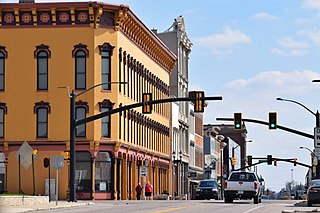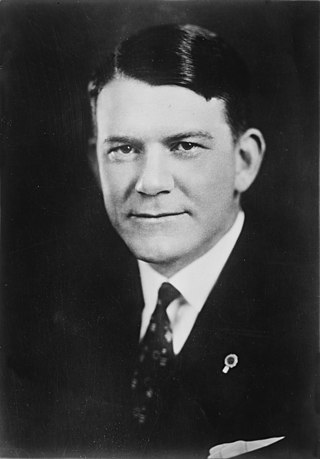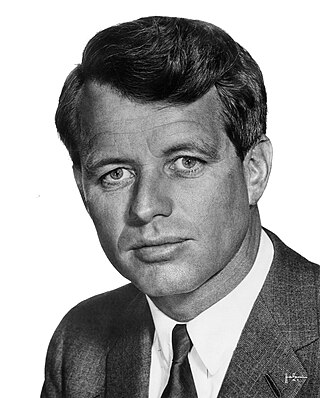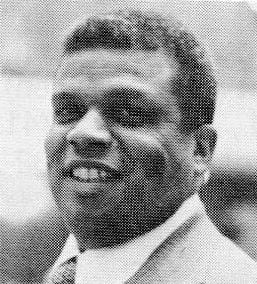Related Research Articles

The 1968 United States presidential election was the 46th quadrennial presidential election, held on Tuesday, November 5, 1968. The Republican nominee, former vice president Richard Nixon, defeated both the Democratic nominee, incumbent vice president Hubert Humphrey, and the American Independent Party nominee, former Alabama governor George Wallace.

Delaware County is a county in the east central portion of the U.S. state of Indiana. As of 2020, the population was 111,903. The county seat is Muncie.

Muncie is an incorporated city and the seat of Delaware County, Indiana. Previously known as Buckongahelas Town, named after the legendary Delaware Chief. It is located in East Central Indiana, about 50 miles (80 km) northeast of Indianapolis. The United States Census for 2020 reported the city's population was 65,194. It is the principal city of the Muncie metropolitan statistical area, which has a population of 117,671.

The Ball brothers were five American industrialists and philanthropists who established a manufacturing business in New York and Indiana in the 1880s that was renamed the Ball Corporation in 1969. The Ball brothers' firm became a global manufacturer of plastic and metal food and beverage containers as well as a manufacturer of equipment and supplier of services to the aerospace industry. In addition to the brothers' manufacturing business, they were also noted for their philanthropy and community service. Earnings from their business ventures provided the financial resources to support a number of other projects in the community of Muncie, Indiana, and elsewhere. Most notably, the brothers became benefactors of several Muncie institutions including Ball State University, Ball Memorial Hospital, the YMCA, Ball stores department store, and Minnetrista. The Ball Brothers Foundation, established in 1926, continues the family's philanthropic interests.

Roger Douglas Branigin was an American politician who was the 42nd governor of Indiana, serving from January 11, 1965, to January 13, 1969. A World War II veteran and well-known public speaker, Branigin took office with a Democratic general assembly, the first time since the Great Depression that Democrats controlled both the executive and legislative branches of the Indiana state government. Branigin was a conservative Democrat who oversaw repeal of the state's personal property taxes on household goods, increased access to higher education, and began construction of Indiana's deep-water port at Burns Harbor on Lake Michigan. During his one term as governor, Branigin exercised his veto power one hundred times, a record number for a single term. Branigin was the last Democrat to serve as governor of Indiana until Evan Bayh took office in 1989.

Philip Riley Sharp is an American politician and nonprofit executive who served ten terms in the United States House of Representatives as a Democratic representative from Indiana from 1975 to 1995.

State Road 332 (SR 332) is a part of the Indiana State Road that runs between Interstate 69 (I–69) and Muncie in US state of Indiana. The 7.64 miles (12.30 km) of SR 332 that lie within Indiana serve as a minor highway. None of the highway is listed on the National Highway System. Various sections are rural four-lane divided highway and urban four-lane highway. The highway passes through farmland, residential and commercial properties.
Jeremy Larner is an author, poet, journalist and speechwriter. He won an Oscar in 1972 for Best Original Screenplay, for writing The Candidate.

Alvin Mansfield Owsley was an American diplomat who served as the National Commander of the American Legion from 1922 to 1923, and later served as United States minister to Romania, the Irish Free State, and Denmark.

The Robert F. Kennedy presidential campaign began on March 16, 1968, when Robert Francis Kennedy, a United States Senator from New York, mounted an unlikely challenge to incumbent Democratic United States President Lyndon B. Johnson. Following an upset in the New Hampshire Primary, Johnson announced on March 31 that he would not seek re-election. Kennedy still faced two rival candidates for the Democratic Party's presidential nomination: the leading challenger United States Senator Eugene McCarthy and Vice President Hubert Humphrey. Humphrey had entered the race after Johnson's withdrawal, but Kennedy and McCarthy remained the main challengers to the policies of the Johnson administration. During the spring of 1968, Kennedy campaigned in presidential primary elections throughout the United States. Kennedy's campaign was especially active in Indiana, Nebraska, Oregon, South Dakota, California, and Washington, D.C. Kennedy's campaign ended on June 6, 1968 when he was assassinated at the Ambassador Hotel in Los Angeles, California, following his victory in the California Primary. Had Kennedy been elected, he would have been the first brother of a U.S. President to win the presidency himself.

On April 4, 1968, United States Senator Robert F. Kennedy of New York delivered an improvised speech several hours after the assassination of Martin Luther King Jr. Kennedy, who was campaigning to earn the Democratic Party's presidential nomination, made his remarks while in Indianapolis, Indiana, after speaking at two Indiana universities earlier in the day. Before boarding a plane to attend campaign rallies in Indianapolis, he learned that King had been shot in Memphis, Tennessee. Upon arrival, Kennedy was informed that King had died. His own brother, John Fitzgerald Kennedy had been assassinated on November 22, 1963. Robert F. Kennedy would be also assassinated two months after this speech, while campaigning for presidential nomination at the Ambassador Hotel in Los Angeles, California.
The 1968 presidential campaign of Eugene McCarthy was launched by United States Senator Eugene McCarthy of Minnesota in the latter part of 1967 to vie for the 1968 Democratic Party nomination for president of the United States. The focus of his campaign was his support for a swift end to the Vietnam War through a withdrawal of American forces. The campaign appealed to youths who were tired of the establishment and dissatisfied with government.

From March 12 to June 11, 1968, Democratic Party voters elected delegates to the 1968 Democratic National Convention for the purpose of selecting the party's nominee for President in the upcoming election. After an inconclusive and tumultuous campaign marred by the assassination of Robert F. Kennedy, incumbent Vice President Hubert Humphrey was nominated the 1968 Democratic National Convention held from August 26 to August 29, 1968, in Chicago, Illinois.

The Landmark for Peace is a memorial sculpture in Dr. Martin Luther King Jr. Park on the northside of Indianapolis. It honors the contributions of the slain leaders Robert F. Kennedy and Martin Luther King Jr. The memorial, which features Kennedy and King reaching out to each other, was designed and executed by Indiana artist Greg Perry. The bronze portraits were created by Indianapolis sculptor Daniel Edwards.

Irving Gymnasium was an indoor athletics facility on the campus of Ball State University in Muncie, Indiana, USA. Opened in 1962 with a capacity of 6,600 spectators, it hosted primarily Ball State Cardinals basketball and volleyball games until Worthen Arena opened in 1992. It hosted the 1972 and 1976 NCAA Men's Volleyball Championship games.

Robert Francis Kennedy, also known by his initials RFK and by the nickname Bobby, was an American politician and lawyer. He served as the 64th United States Attorney General from January 1961 to September 1964 and as a U.S. senator from New York from January 1965 until his assassination. Like his brothers John F. Kennedy and Ted Kennedy, he was a prominent member of the Democratic Party and is viewed by some historians as an icon of modern American liberalism.

The 1968 presidential campaign of Hubert Humphrey began when Vice President of the United States Hubert Humphrey of Minnesota decided to seek the Democratic Party nomination for President of the United States following President Lyndon B. Johnson's announcement ending his own bid for the nomination. Johnson withdrew after an unexpectedly strong challenge from anti-Vietnam War presidential candidate, Senator Eugene McCarthy of Minnesota, in the early Democratic primaries. McCarthy, along with Senator Robert F. Kennedy of New York, became Humphrey's main opponents for the nomination. Their "new politics" contrasted with Humphrey's "old politics" as the increasingly unpopular Vietnam War intensified.

On the Mindless Menace of Violence is a speech given by United States Senator and presidential candidate Robert F. Kennedy. He delivered it in front of the City Club of Cleveland at the Sheraton-Cleveland Hotel on April 5, 1968, the day after the assassination of Martin Luther King Jr. With the speech, Kennedy sought to counter the King-related riots and disorder emerging in various cities, and address what he viewed as the growing problem of violence in American society.
"Conflict in Vietnam and at Home" was a speech given on March 18, 1968, by U.S. Senator Robert F. Kennedy at Kansas State University. Having only declared his candidacy for president two days before, the address was Kennedy's first official campaign speech. He discussed student protests, consequences of the Vietnam War, and Lyndon B. Johnson's leadership of the country.

Hurley Charles Goodall Jr. was an American author, historian, and politician who served in the Indiana House of Representatives from the 38th district as a member of the Democratic Party from 1978 to 1992. Prior to his tenure in the state legislature he was active in local politics and served on the school board in Muncie, Indiana.
References
- 1 2 3 4 5 Straw, John B. (2005). "RFK in Middletown, Robert Kennedy's speech at Ball State University on April 4, 1968". Ball State University.
- 1 2 3 4 5 6 7 8 Clarke, Thurston (2008). The Last Campaign: Robert F. Kennedy and 82 Days That Inspired America (illustrated ed.). Macmillan. pp. 84–88. ISBN 9780805077926.
- 1 2 3 4 5 6 Boomhower, Ray E. (2008). Robert F. Kennedy and the 1968 Indiana Primary. Indiana University Press. pp. 59–61. ISBN 9780253007759.
